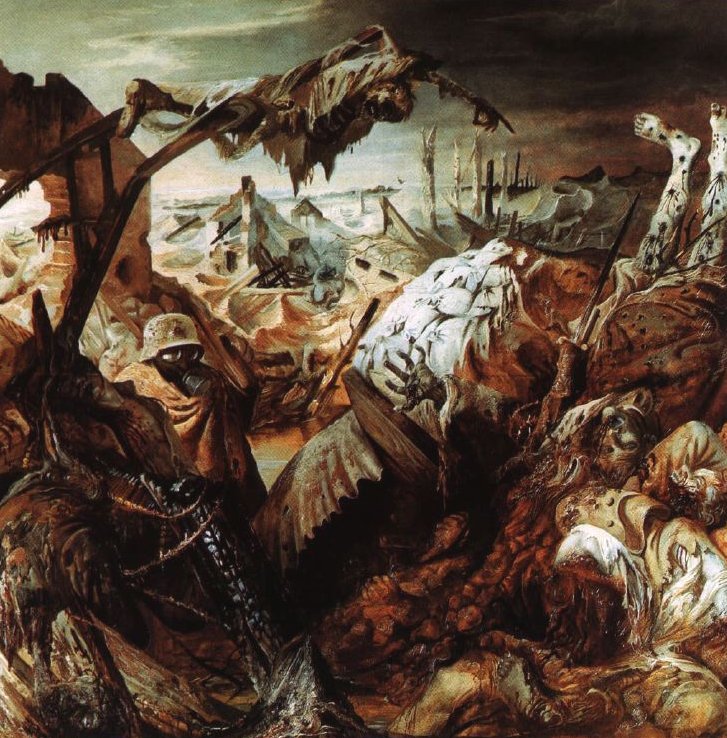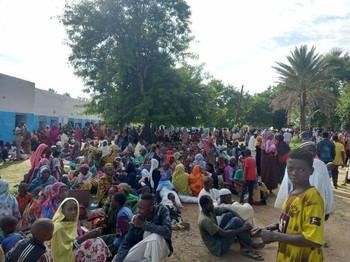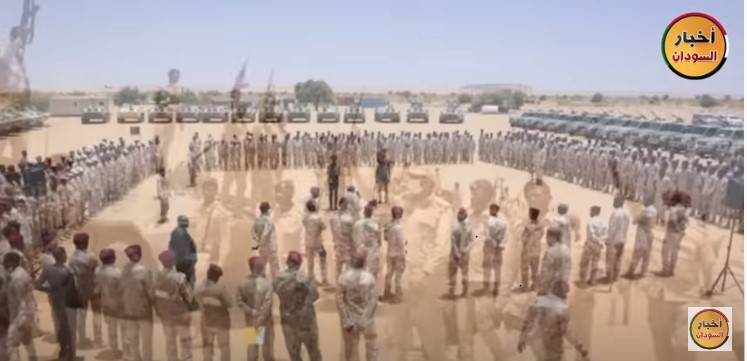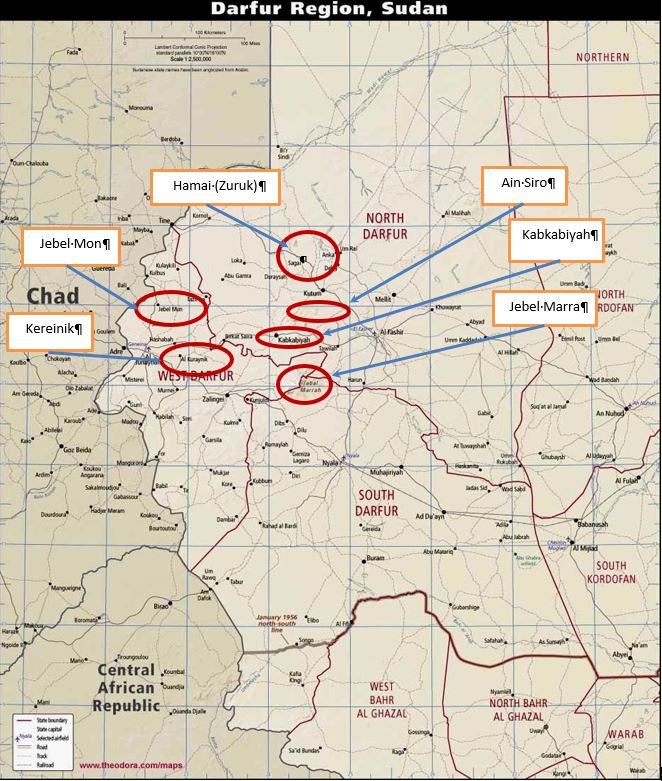by Lt. General (ret.) Abakar M. Abdallah and Jerry Gordon (August 2022)

The Trench, Otto Dix, 1923

Global politics are interesting. The Biden Administration has nominated Mohamed Hag Magid, a well-known Islamic scholar who whitewashed the dreadful extermination of Christians in Sudan by the Muslim Brothers regime of Khartoum between 1980 and the beginning of the year 2000. Speaking at a conference in Georgetown in 2004, Magid declared that reports regarding Christian massacre in Sudan were baseless. He was also suspected of collaborating with the Muslim Brothers charity organization that channeled funds to Palestinian Jihadists. Despite Magid’s conflicting behaviors, he gained the trust of successive US administrations.[1]
The actions of successive US administrations with Sudan’s extremist Jihadist regimes have conflicted with the reality of fighting the global war on terrorism. While Sudan’s former President Omar al Bashir was supporting terrorism and committing genocide on Sudanese indigenous population for the last 30 years, five successive US Administrations during this period in one way or another cooperated with his regime. When one asked why they did this? They simply denied the facts that the US government was cooperating with the Bashir regime. Instead, they blamed the CIA. The question one could ask is, “What is the CIA in relation to the US Administration—isn’t it part of the US government?”[2],[3] Despite the collapse of the Bashir regime, the US and Israeli governments, UN, and Troika group of nations (currently Norway, UK, and US) have been working closely behind the scenes with the Saudis and Emirates to maintain in power the genocidal junta of Generals Mohamed Hamdan Dogolo (Hemeti) and Abdel Fattah Al Burhan. Despite the failure of numerous propositions, they presented to resolve Sudan’s crisis, they insist that the October 25, 2021, junta should be part of the government. Forming a government composed of the military junta and the Forces of Freedom and Change is an idea that is categorically rejected by Sudanese resistance groups.
The calls of these governments trying to help the Sudanese people to achieve democracy and establish civilian government is nothing but a deception to reduce public tension which led the junta to restore another dictatorship. Calls for democracy, human rights, fighting global war on terrorism, to preserve peace, and trying to settle Sudan’s crisis that we see regularly dominating news headlines are nothing but a sham to wear down Sudanese protesters and strengthen the Rapid Support Force Jihadist Militias. Militias that are equipped and funded by the oil rich Middle East emirates to fight in Yemen, cleanse and dispossess the indigenous people of Darfur from their land and exploit the immensely valuable mineral resources in the region. It is vital that these friendly governments conduct actions to help Sudanese establish a civilian government.
US campaigns for democracy, human rights as well as freedom without meaningful assistances to help oppressed people rid these countries of dictators is meaningless. Moreover, engaging dictators is the main reason the US has lost credibility, especially in Africa. The absence of a clear US policy in Africa, enabled China and Russia to seize the opportunity and through deals with some of the corrupt leaders to exploit the continent’s rich resources.

The US is also doing very little compared to China and Russia regarding development of infrastructure in Sudan and other African countries. China constructs roads, builds government institutions such as parliamentary buildings, public hospitals, stadiums, drills for oil, and grants long term loans. Russia on the other hand, protects corrupt leaders with its mercenary Wagner Group that sells arms and exploits natural resources, sharing the profit with regional dictators. US democratic rule of law and human rights doctrine is meaningless without programs to support both economic and political institutional developments to realize these goals. Oppressed people of Africa aspire to ideas of freedom, democracy and human rights issues struggle for years; however, achievement of these desired aims is not possible for the lack of material assistance. In most cases, the US ends up abandoning these oppressed people instead cooperating with dictators. One example is the CIA cooperating with ousted Sudan President Bashir’s regime,[4], despite 30 years of US economic sanctions against the corrupt regime. That allowed Bashir and the National Congress Party Islamist hierarchy to execute plans to commit genocide in Darfur and the other indigenous regions of Sudan.

Hemeti Arming and Mobilizing Trial Militias Threatening People of Darfur [5]
On July 2, 2022, Sudan coup leader General Dogolo “Hemeti,” in a televised conference, threatened the Darfuri people of el Geneina and villagers of Jebel Moon saying that if they refused to hand over the mountains rich with gold, uranium, and other mineral resources, he would “bring them rain without lightning”. By saying this, he communicated that he was going to attack Jebel Moon with his militia force equipped with an estimated five thousand Toyota Jeeps and three hundred tanks. His declaration to remain three months in Darfur negotiating tribal reconciliations is nothing but a lie. His real intent is to pursue a military operation against villagers. Based on the West Darfur Civil Society Group declaration of July 14, 2022, the objective of the Central delegation headed by Hemeti in Darfur is to hold secret meetings with tribal leaders signing superficial reconciliations that do not recognize the rights of the victims. Furthermore, these tribal agreements are signed with leaders who have no connections with the people concerned.
According to Sudanese social media reports, Hemeti agreed with Russia’s paramilitary Wagner Group and the Emirates to expel villagers and occupy their land, especially in Jebel Moon so that they can bring their companies and exploit mineral resources. He plans to seize four mountains that are rich in gold, uranium, and platinum. These mountains include, Jebel Moon, Jebel Marra, Ain Siro and Kerenic. Using government- supplied weapons his militia occupied Zuruk and Kolgue, land belonging to the Zaghawa Darfuri tribe. Furthermore, his militias prohibited farmers from cultivating their farms especially in areas of Kabkabiyan and Kutum, North Darfur. The RSF/Janjaweed militias  imposed these conditions on farmers restricting their ability to cultivate their farms. They told the villagers that they will be allowed to cultivate their land only if they agree to give away half of their land and pay half of their harvested crops to the militias. The militias also engaged in criminal acts killing or forcing indigenous men to flee for safety and then marrying their wives to allow them to inherit the land.
imposed these conditions on farmers restricting their ability to cultivate their farms. They told the villagers that they will be allowed to cultivate their land only if they agree to give away half of their land and pay half of their harvested crops to the militias. The militias also engaged in criminal acts killing or forcing indigenous men to flee for safety and then marrying their wives to allow them to inherit the land.
The international community should be aware of this rape of Darfur by Hemeti and his RSF/Janjaweed militias implementing the Arab Coalition Plan of the deposed Bashir regime. The Darfuri people have no option but to mobilize and fight to restore their land.
Origin of Sudan’s Genocide, Ethnic Cleansing, and Intercommunal Violence
The post December 2019 Sudan fractious political landscape is characterized by RSF/Janjaweed ethnic cleansing and genocide in Darfur with over an estimated one thousand people killed. These are not the only victims during this time. Sudan security forces killed hundreds of protesters at the army Headquarters in Khartoum over the period from June 3, 2019, to the post October 25, 2021 Coup led by Generals al-Burhan and Dogolo “Hemeti.”
Moreover, there have been a series of Intercommunal clashes in Kordofan in Eastern Sudan and elsewhere. The most recent intercommunal violence erupted on July 16, 2022, between the Hausa and Barta communities in the Blue Nile State during which hundreds of people were killed from both sides and thousands wounded. Some 4,500 others were internally displaced.
Some Sudanese political parties and politicians accuse Sudan People’s Liberation Movement leader and Juba Peace Accord signatory Malik Agar of being behind the crisis. Engineer Ibrahim Khanagui, a native of Blue Nile State, said that the clashes erupted because Agar approved an Islamist Emirate for Hausa because he wanted to establish a political incubator for the Hausa community.[6] Agar allegedly did this without consulting with the traditional chieftain the inheritor of Funj Kingdom. The Funj King rejected the establishment of an Emirate without normal traditional procedures. Fighting broke out because the Hausa threatened the Funj King and attempted to impose their authority using force.
Hausas were originally a large ethnic group from the Northern part of Nigeria who migrated to Sudan and other countries in the region. They are the largest group in West Africa. Hausas first arrived in Sudan in the 18 and 19th centuries with the intention of traveling to Mecca, Saudi Arabia for the Haj pilgrimage (to perform Islam religious duties) with many of them settling in Sudan. Even though, they have lived in Sudan for centuries and Hausa leaders occupying high positions in government, they were not able to fully assimilate into the Sudanese society choosing to live separately in large communities of their own maintaining their culture, language, food, music, and dance. New arrivals from West Africa enabled the Hausa communities to maintain their separate identity in Sudanese society. In 1994, the Islamist scholar Hassan Abdallah Turabi, who was the speaker of the Khartoum Parliament introduced a law guaranteeing Sudan nationality for those born in Sudan or who lived in the country for years.[7] Despite the law allowing them nationality, in the November 2008 presidential election, former President Bashir declared that Hausas are not Sudanese and they have no right to participate in the election.[8] Surprisingly Bashir is Hausa by origin. Hausa like other indigenous Sudanese societies have been marginalized by denying them nationality. Hausas are peaceful and hardworking people. They participate in all works of life in Sudan. For instance, the Vice President of Sudan during President Nimeiri’s regime was Abulgasim Mohamed Ibrahim a Hausa. Dr. Abdelaziz Musa, who authored a book on the Hausa and teaches at Bahri University is a Hausa. Famous Sudanese singer, Aisha Musa Ahmed (Aisha Falatiya) is Hausa. She was the first woman in 1942 to sing on the Sudan National radio and on the Sudan’s Independence Day. The famous Jazz Musician in Sudan is Sharhabil Ahmed. Army General Yusif Osman is also a Hausa as are many others.
Similar crises are occurring in Darfur, Kordofan and now Blue Nile and in the rest of Sudan. These periodic uprisings originated in Muslim Brotherhood policies established in 1990s with the objective to continue rule of Sudan under Islamist extremist ideology and spread Jihadist doctrine around the globe. They planned to bring world terrorists groups and Muslim communities especially from African states, issue them Sudanese documentation and settle them using force in indigenous peoples’ lands. The recent tribal clashes and ethnic cleansing that is ongoing in Darfur, Kordofan, Eastern Sudan and Blue Nile are part of the work continuing to implement the Arab Coalition Plan despite facing stiff resistance from various Sudanese societies. People rejected these policies of injustice, oppression and in frustration; they resisted the regime until Former dictator President Bashir was deposed in April 2019. Despite Bashir being ousted, his jihadist militias and followers remained in control and continually commit atrocities on the unprotected indigenous populations.
The Sudanese societies have long historical traditions inherited through generations. The historical legacies that preserved these rights continue for centuries laid the foundations and rules governing the societies and the land. The ethnic and tribal administrative system of governance, judicial systems, land ownership and use were established many centuries ago by the indigenous societies inhabiting the Blue Nile, Darfur, Beja, and Nuba Mountains and other places in the country. Seizing power in 1989 through a military coup, the National Islamic Front later became the National Congress Party that ruled the country for the next 30 years with an iron fist in Sudan. In 1993, the former Vice President of Sudan, Ali Osman Mohamed Taha was appointed Minister of Social Planning. One of the functions of the Ministry was to transform the Sudanese society to conform to the dictates of the so-called “civilization project.” The central objectives of the “civilization project” were to Islamize and Arabize Sudanese society to transform the state into a religiously extremist ideological hub, export Islamic extremist ideas abroad, support and engage in global Jihad.
Taha organized a conference in Soba on the outskirts of Khartoum. He invited most of Sudan’s traditional Chiefs and created a new system known as Emirate or Emir to function parallel to the existing systems such as a sultanate, Shartay or Umda (traditional Chiefs). Such a system did not exist in Sudan’s traditional administrative system. They created such system with the intention to give their Jihad groups an opportunity to work as traditional chiefs and mobilize people for jihad against Sudan People’s Liberation Army (SPLA) forces in Southern Sudan and the Nuba Mountains. The Emirate was first introduced and applied in the Nuba Mountains with the objective to mobilize Nuba people themselves to fight against SPLA. Among the famous Emirs who recruited and mobilized people for Jihad during those days was Kafe Tayar al Badin. The same strategy of the Emirate was applied in Western Darfur in 1996. The problem began when the Governor of West Darfur, Mohamed Ahmed al Fadul issued a declaration partitioning Western Darfur region into 13 Emirates and gave 8 Emirs positions to newly arrived foreign Arabs and only five to Massalit the owners of the land. When Massalit protested, the Khartoum government sent General Mohamed Mustapha al Dabi and then Lieutenant, now General al-Burhan to conduct military operations in the region, where they attacked and burned 512 villages displacing their residents.
There is no government in the world that hates its own citizens and is thinking of replacing them with foreigners except in Sudan. The Junta has no intention of protecting people. The Sudan’s Armed Forces with RSF/Janjaweed militias and Sudan Police Force equipped with heavy weapons failed to provide security protection for the vulnerable population. Instead, they allow people to take the law into their own hands and mercilessly kill one another.
Conclusion
Fighting global war on terrorism is vital. Many foreign policy experts concerned with African affairs see it as a US problem if it does not incorporate development projects that benefit the local population. People need assistance not only in theory but in practice in various areas of security, education, governance, democracy, and human rights.
Following the overthrow of Bashir in 2019, the US administrations engaged with the coup plotters who stole the December revolution and perpetrated the October 2021Coup. Generals Burhan and Dogolo “Hemeti” whose clique hold power continually commit genocide and ethnic cleansing in Sudan. Sudan under the coup junta is allied with America’s geopolitical enemy Russia’s Putin and his paramilitary Wagner Group, despoiling the country’s resources, impoverishing, and ethnically cleansing its people. The US and Israel are hampered by the necessity of providing collective security for Arab Emirates and kingdoms against a rising nuclear armed Iran and regional proxies allied with Putin’s Russia, the latter engaged in a provocative war in Ukraine threatening the EU and NATO.
What the Biden Administration should consider doing in Sudan is engage directly with the Sudanese stakeholders. for example, The Administration might consider providing financial and material support to the US trained leadership of the Sudan United Movement to dismantle RSF/Janjaweed militias thereby ending atrocities in Sudan, particularly in Darfur. There are other examples in South Kordofan and the Blue Nile State. The US should assist the people of Sudan to achieve a democratic civilian government respecting human rights and treating all Sudanese with dignity and equality under the rule of law.
[1] https://islamism.news/2022/07/13/apologist-for-sudan-genocide-on-commission-that-condemned-it/
[2] https://www.nytimes.com/2005/06/18/politics/cia-role-in-visit-of-sudan-intelligence-chief-causes-dispute.html
[3] https://theconversation.com/how-foreign-backing-is-keeping-sudans-omar-al-bashir-in-power-109522
[4] https://www.nytimes.com/2005/06/18/politics/cia-role-in-visit-of-sudan-intelligence-chief-causes-dispute.html
[5] See YouTube Video on Hemeti and his RSF/Janjaweed militias show of force in Zuruk: https://www.youtube.com/watch?v=1uSuGpE02t8
[6] https://www.facebook.com/100003563464702/videos/500841145133503
[7] https://www.bbc.com/news/world-africa-62175714
[8] https://sudantribune.com/article29043
Jerry Gordon is a Senior Editor of The New English Review, author of The West Speaks, NERPress, 2012 and co-author of Jihad in Sudan: Caliphate Threatens Africa and the World, JAD Press, 2017. From 2016 to 2020, he was producer and co-host of Israel News Talk Radio-Beyond the Matrix.
Follow NER on Twitter @NERIconoclast
- Like
- Digg
- Tumblr
- VKontakte
- Buffer
- Love This
- Odnoklassniki
- Meneame
- Blogger
- Amazon
- Yahoo Mail
- Gmail
- AOL
- Newsvine
- HackerNews
- Evernote
- MySpace
- Mail.ru
- Viadeo
- Line
- Comments
- SMS
- Viber
- Telegram
- Subscribe
- Skype
- Facebook Messenger
- Kakao
- LiveJournal
- Yammer
- Edgar
- Fintel
- Mix
- Instapaper
- Copy Link






